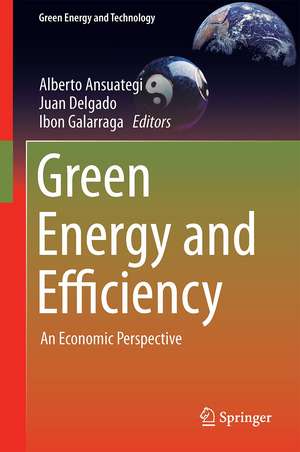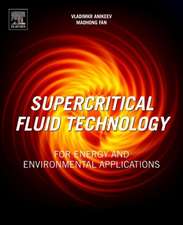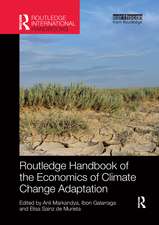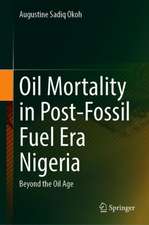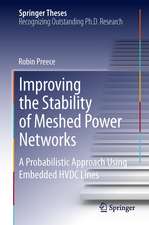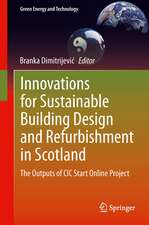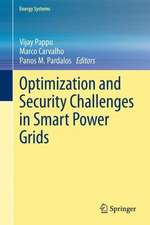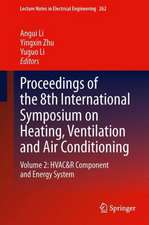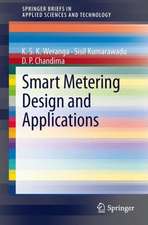Green Energy and Efficiency: An Economic Perspective: Green Energy and Technology
Editat de Alberto Ansuategi, Juan Delgado, Ibon Galarragaen Limba Engleză Hardback – 13 noi 2014
This book covers important themes including regulation for green energy, the promotion of green energyand efficiency, the challenges and options of renewable energy, and efficiency in economic sectors. It is intended for researchers and postgraduates with an interest in energy, climate change and environmental economics, and also policymakers and energy companies.
| Toate formatele și edițiile | Preț | Express |
|---|---|---|
| Paperback (1) | 647.40 lei 6-8 săpt. | |
| Springer International Publishing – 10 sep 2016 | 647.40 lei 6-8 săpt. | |
| Hardback (1) | 653.98 lei 6-8 săpt. | |
| Springer International Publishing – 13 noi 2014 | 653.98 lei 6-8 săpt. |
Din seria Green Energy and Technology
- 18%
 Preț: 943.43 lei
Preț: 943.43 lei - 20%
 Preț: 629.52 lei
Preț: 629.52 lei - 18%
 Preț: 1124.92 lei
Preț: 1124.92 lei - 18%
 Preț: 947.35 lei
Preț: 947.35 lei - 15%
 Preț: 655.92 lei
Preț: 655.92 lei - 18%
 Preț: 957.62 lei
Preț: 957.62 lei - 18%
 Preț: 789.52 lei
Preț: 789.52 lei - 17%
 Preț: 464.56 lei
Preț: 464.56 lei - 15%
 Preț: 645.79 lei
Preț: 645.79 lei - 18%
 Preț: 903.93 lei
Preț: 903.93 lei - 24%
 Preț: 1322.09 lei
Preț: 1322.09 lei - 18%
 Preț: 890.54 lei
Preț: 890.54 lei - 18%
 Preț: 1115.46 lei
Preț: 1115.46 lei - 18%
 Preț: 1117.03 lei
Preț: 1117.03 lei - 18%
 Preț: 949.73 lei
Preț: 949.73 lei - 18%
 Preț: 892.11 lei
Preț: 892.11 lei - 15%
 Preț: 648.24 lei
Preț: 648.24 lei - 18%
 Preț: 997.09 lei
Preț: 997.09 lei - 15%
 Preț: 579.81 lei
Preț: 579.81 lei - 18%
 Preț: 1123.15 lei
Preț: 1123.15 lei - 18%
 Preț: 961.41 lei
Preț: 961.41 lei - 17%
 Preț: 490.23 lei
Preț: 490.23 lei - 18%
 Preț: 904.60 lei
Preț: 904.60 lei - 15%
 Preț: 643.34 lei
Preț: 643.34 lei -
 Preț: 287.91 lei
Preț: 287.91 lei - 24%
 Preț: 634.05 lei
Preț: 634.05 lei -
 Preț: 379.40 lei
Preț: 379.40 lei - 18%
 Preț: 783.20 lei
Preț: 783.20 lei - 18%
 Preț: 956.09 lei
Preț: 956.09 lei - 18%
 Preț: 1394.84 lei
Preț: 1394.84 lei - 18%
 Preț: 1691.57 lei
Preț: 1691.57 lei - 15%
 Preț: 592.61 lei
Preț: 592.61 lei - 18%
 Preț: 952.09 lei
Preț: 952.09 lei - 18%
 Preț: 944.19 lei
Preț: 944.19 lei - 18%
 Preț: 891.33 lei
Preț: 891.33 lei - 18%
 Preț: 1252.44 lei
Preț: 1252.44 lei - 18%
 Preț: 789.52 lei
Preț: 789.52 lei - 20%
 Preț: 566.30 lei
Preț: 566.30 lei - 18%
 Preț: 1112.48 lei
Preț: 1112.48 lei - 18%
 Preț: 1114.24 lei
Preț: 1114.24 lei - 18%
 Preț: 1113.71 lei
Preț: 1113.71 lei - 18%
 Preț: 1011.45 lei
Preț: 1011.45 lei - 24%
 Preț: 590.60 lei
Preț: 590.60 lei - 20%
 Preț: 567.50 lei
Preț: 567.50 lei - 24%
 Preț: 907.50 lei
Preț: 907.50 lei - 18%
 Preț: 952.89 lei
Preț: 952.89 lei
Preț: 653.98 lei
Preț vechi: 769.39 lei
-15% Nou
Puncte Express: 981
Preț estimativ în valută:
125.15€ • 135.90$ • 105.13£
125.15€ • 135.90$ • 105.13£
Carte tipărită la comandă
Livrare economică 22 aprilie-06 mai
Preluare comenzi: 021 569.72.76
Specificații
ISBN-13: 9783319036311
ISBN-10: 3319036319
Pagini: 428
Ilustrații: XII, 428 p. 107 illus.
Dimensiuni: 155 x 235 x 30 mm
Greutate: 0.79 kg
Ediția:2015
Editura: Springer International Publishing
Colecția Springer
Seria Green Energy and Technology
Locul publicării:Cham, Switzerland
ISBN-10: 3319036319
Pagini: 428
Ilustrații: XII, 428 p. 107 illus.
Dimensiuni: 155 x 235 x 30 mm
Greutate: 0.79 kg
Ediția:2015
Editura: Springer International Publishing
Colecția Springer
Seria Green Energy and Technology
Locul publicării:Cham, Switzerland
Public țintă
ResearchCuprins
Introduction.- Promoting green energy and efficiency.- Renewable energy.- Efficiency in economic sectors.- Epilogue.
Notă biografică
Alberto Ansuategi graduated with a DPhil in Environmental Economics, University of York (2000)., MSc (1993) and BSc (1990) at the University of the Basque Country (UPV/EHU). He is currently Associate Professor at the UPV/EHU.
His research interest includes energy and climate economics, resource economics and macroeconomics. He has published a number of articles in peer-reviewed journals such as Energy Policy, Ecological Economics, Environmental and Resource Economics and Climate Policy.
He is currently director of the Low Carbon Programme, a joint research initiative of the Basque Centre for Climate Change (BC3), the Repsol Foundation and the University of the Basque Country.
From December 2005 to June 2009 he was director of scientific policy in the Basque Ministry of Education, universities and, as such, he was member of the Committee of Experts, representing Spain, at the People Programme (7th Framework Programme of the European Commission), member of the Spanish General Council of Research and Technology, member of the Spanish National Council for Assessment of Research Activity, member of the Basque Council of Research, member of the Basque Council of Universities, member of the Basque Council of Public Education and member of the steering boards of many Spanish and Basque research and technology centers.
Juan Delgado graduated with a Ph.D. in Economics from the Universidad Carlos III in Madrid (Spain), MSc Economics from the University of Warwick (UK) and BSc Economics from the University of Alicante (Spain).
Dr. Delgado is a Senior Research Associate at the Basque Center for Climate Change BC3 - Low Carbon Programme in Bilbao, Spain. Until 2011, he was the first chief economist of the Spanish Competition Commission, CNC. Prior to his work at the CNC, Dr. Delgado served as a research fellow at the influential European think-tank Bruegel and at Harvard University’s Kennedy School of Government. His work focussedon regulation and competition with a special focus on the design of energy and climate policies. He was the co-author of the booklet "Energy, Choices for Europe" and co-editor of the book "Beyond Copenhagen: a Climate Policymaker's Handbook".
Dr. Delgado has also worked for the European Commission and for the Spanish Telecom’s regulatory agency.
Dr. Delgado is currently Managing Director at Global Economics Group and lectures at Universidad Carlos III and at IE University in Madrid.
Dr. Delgado has published extensively in academic and policy journals, including the European Competition Law Review, Economic Theory, Journal of Economic Theory, Journal of Industrial Economics, and Cesifo Economic Studies. He is also a frequent speaker at specialized events and conferences around the world.
Ibon Galarraga graduated with a Ph.D. in Economics (Environmental Economics) from the University of Bath (UK), M.A. Economics at the university of Essex (UK) and BA Economics (speciality of international economics and development) at the University of Basque Country.
He has worked as an environmental consultant for many years for both public and private clients such as the World Bank, the department for international development of the British government or the Basque government. He was co-founder of a consultancy company.
He taught microeconomics and macroeconomics at the university of bath and economic policy at the University of Deusto. He has several publications in the field of environmental economics in journals such as Energy Economics, Climate Policy, Journal of Cleaner Production, European Environment, Fiscal Studies, Economía Agraria y Recursos Naturales or Papeles de Economía Española.
From July 2005 to May 2009, he was the deputy minister for the environment of the Basque government, executive vice-president of the Environmental Public Society Ihobe and member of the board of the Basque Energy Board (EVE). While in this position he was in charge of the preparation of the environmental framework programme 2007-2010, the Basque plan to combat climate change 2008-2012 or the contaminated soil plan 2007-2012. He represented the Basque government at the Consejo Nacional del Clima (National Climate Council). Regarding the international sphere, he was the deputy co-chair of the Network of Regional Governments on Sustainable Development (NRG4SD) from 2005-2008, and has actively participated in the COP 11, COP 12, COP 13 and COP 14.
Since he joined the BC3 as research professor he has published a number of research papers and has participated in many supportive managerial activities as well as BC3 projects.
His research interest includes energy and climate economics, resource economics and macroeconomics. He has published a number of articles in peer-reviewed journals such as Energy Policy, Ecological Economics, Environmental and Resource Economics and Climate Policy.
He is currently director of the Low Carbon Programme, a joint research initiative of the Basque Centre for Climate Change (BC3), the Repsol Foundation and the University of the Basque Country.
From December 2005 to June 2009 he was director of scientific policy in the Basque Ministry of Education, universities and, as such, he was member of the Committee of Experts, representing Spain, at the People Programme (7th Framework Programme of the European Commission), member of the Spanish General Council of Research and Technology, member of the Spanish National Council for Assessment of Research Activity, member of the Basque Council of Research, member of the Basque Council of Universities, member of the Basque Council of Public Education and member of the steering boards of many Spanish and Basque research and technology centers.
Juan Delgado graduated with a Ph.D. in Economics from the Universidad Carlos III in Madrid (Spain), MSc Economics from the University of Warwick (UK) and BSc Economics from the University of Alicante (Spain).
Dr. Delgado is a Senior Research Associate at the Basque Center for Climate Change BC3 - Low Carbon Programme in Bilbao, Spain. Until 2011, he was the first chief economist of the Spanish Competition Commission, CNC. Prior to his work at the CNC, Dr. Delgado served as a research fellow at the influential European think-tank Bruegel and at Harvard University’s Kennedy School of Government. His work focussedon regulation and competition with a special focus on the design of energy and climate policies. He was the co-author of the booklet "Energy, Choices for Europe" and co-editor of the book "Beyond Copenhagen: a Climate Policymaker's Handbook".
Dr. Delgado has also worked for the European Commission and for the Spanish Telecom’s regulatory agency.
Dr. Delgado is currently Managing Director at Global Economics Group and lectures at Universidad Carlos III and at IE University in Madrid.
Dr. Delgado has published extensively in academic and policy journals, including the European Competition Law Review, Economic Theory, Journal of Economic Theory, Journal of Industrial Economics, and Cesifo Economic Studies. He is also a frequent speaker at specialized events and conferences around the world.
Ibon Galarraga graduated with a Ph.D. in Economics (Environmental Economics) from the University of Bath (UK), M.A. Economics at the university of Essex (UK) and BA Economics (speciality of international economics and development) at the University of Basque Country.
He has worked as an environmental consultant for many years for both public and private clients such as the World Bank, the department for international development of the British government or the Basque government. He was co-founder of a consultancy company.
He taught microeconomics and macroeconomics at the university of bath and economic policy at the University of Deusto. He has several publications in the field of environmental economics in journals such as Energy Economics, Climate Policy, Journal of Cleaner Production, European Environment, Fiscal Studies, Economía Agraria y Recursos Naturales or Papeles de Economía Española.
From July 2005 to May 2009, he was the deputy minister for the environment of the Basque government, executive vice-president of the Environmental Public Society Ihobe and member of the board of the Basque Energy Board (EVE). While in this position he was in charge of the preparation of the environmental framework programme 2007-2010, the Basque plan to combat climate change 2008-2012 or the contaminated soil plan 2007-2012. He represented the Basque government at the Consejo Nacional del Clima (National Climate Council). Regarding the international sphere, he was the deputy co-chair of the Network of Regional Governments on Sustainable Development (NRG4SD) from 2005-2008, and has actively participated in the COP 11, COP 12, COP 13 and COP 14.
Since he joined the BC3 as research professor he has published a number of research papers and has participated in many supportive managerial activities as well as BC3 projects.
Textul de pe ultima copertă
Addressing the major issues associated with green energy and energy efficiency, this book examines the economics of energy from the theoretical as well as applied perspectives. It makes a valuable contribution to existing discussion around environment and climate change issues, and provides an analysis of the socioeconomic and policy-oriented aspects of this topic. Each chapter is self-contained and tackles the fundamental issues and latest developments of a particular sub-topic. Combining rigour and accessibility, this book allows non-specialized readers to understand the complexity of the topic, and to likewise access the most relevant and up-to-date literature. It simultaneously enables more specialized readers to broaden their understanding of complex energy topics and it provides a comprehensive overview of the cutting-edge developments of the issues covered by the book.
This book covers important themes including regulation for green energy, the promotion of green energyand efficiency, the challenges and options of renewable energy, and efficiency in economic sectors. It is intended for researchers and postgraduates with an interest in energy, climate change and environmental economics, and also policymakers and energy companies.
About the Series
Climate change, environmental impact and declining natural resources are driving scientific research and novel technical solutions. Green Energy and Technology serves as a publishing platform for scientific and technological approaches to “green”—i.e., environmentally friendly and sustainable—technologies. While the main focus lies on energy and power supply, the series also covers green solutions in industrial engineering and engineering design. Green Energy and Technology is a monograph series addressing researchers, advanced students and technical consultants, as well as decision makers in industry and politics. The level of presentation ranges from instructional to highly technical.
This book covers important themes including regulation for green energy, the promotion of green energyand efficiency, the challenges and options of renewable energy, and efficiency in economic sectors. It is intended for researchers and postgraduates with an interest in energy, climate change and environmental economics, and also policymakers and energy companies.
About the Series
Climate change, environmental impact and declining natural resources are driving scientific research and novel technical solutions. Green Energy and Technology serves as a publishing platform for scientific and technological approaches to “green”—i.e., environmentally friendly and sustainable—technologies. While the main focus lies on energy and power supply, the series also covers green solutions in industrial engineering and engineering design. Green Energy and Technology is a monograph series addressing researchers, advanced students and technical consultants, as well as decision makers in industry and politics. The level of presentation ranges from instructional to highly technical.
Caracteristici
Addresses the major issues associated with green energy and energy efficiency Provides in-depth explorations of up-to-date research developments through dedicated chapters by experts in the field Covers a broad spectrum of energy related issues to promote and implement green energy with a focus on the efficiency in the economic sector Includes supplementary material: sn.pub/extras
